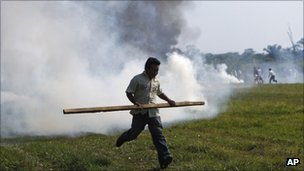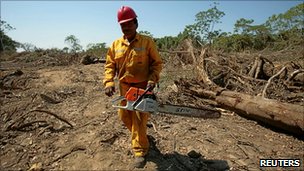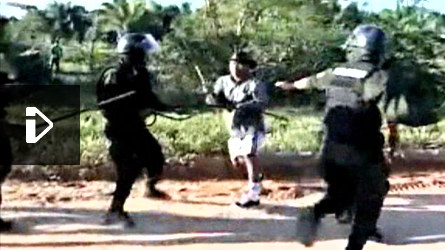Bolivia minister quits in growing row over road protest
September 26, 2011 - BBC
Witnesses said about 500 police surrounded the protesters
Bolivian Defence Minister Cecilia Chacon has resigned in protest at the government's decision to deploy police to break up an anti-road march.
Her resignation came amid growing public anger at the police action which saw some 500 officers fire tear gas and round up indigenous demonstrators.
The protesters had been marching since mid-August against plans to build a road through a rainforest reserve.
President Evo Morales says the road is essential for Bolivia's development.
However, on Sunday he offered to put the issue to a regional referendum.
 (left) Demonstrators blocked a landing strip on Monday to prevent police flying detainees out
(left) Demonstrators blocked a landing strip on Monday to prevent police flying detainees out
Hours later, police wielding batons moved to clear the demonstrators from their camp outside the town of Yucomo, where they were stopped last week.
Protest leaders said dozens of people had been put on buses and driven away.
Local police chief Oscar Munoz said they were being taken back to their hometowns.
The Bolivian ombudsman, Rolando Villena, criticised what he said was excessive use of force by the police.
"Injured children, disappeared mothers who didn't want to separate from their children - this does not talk well about our democracy. This is not democracy," he said.
And on Monday, trade unions, indigenous associations and opposition parties all condemned the police action.
In a letter to President Morales, Ms Chacon gave notice of her "irrevocable" resignation.
"I do not agree with the decision to intervene in the march and I cannot defend or justify the measure when other alternatives existed," her letter said.
Deforestation
Also on Monday, people seized the landing strip in the Amazon town of Rurrenabaque to prevent police from flying detained protesters out of the area.
Hundreds of people set off last month from Trinidad to walk 500km (310 miles) to Bolivia's main city, La Paz, but were stopped at Yucomo, with about half the journey covered.
On Saturday, they briefly detained the foreign minister, David Choquehuanca, forcing him to walk with them.
Mr Choquehuanca, who had come to negotiate with the protesters, said the fact that he was freed showed "they want to resolve matters through dialogue".
 (right) The road is already under construction
(right) The road is already under construction
Plans for a road through the Isiboro-Secure Indigenous Territory and National Park - known by its Spanish acronym Tipnis - have divided opinion in Bolivia.
Indigenous people who live in the reserve say the highway would encourage illegal settlement and deforestation in their ancestral Amazon homeland.
But others, including Mr Morales, say the road would help bring basic services to isolated communities, and also boost the local economy by giving farmers better access to markets.
The road, which would link the highland city of Cochabamba with San Ignacio de Moxos in the Amazon lowlands, is being funded by Brazil and built by a Brazilian company.
The march is the latest in a series of challenges Mr Morales is facing from the indigenous groups and social movements that helped make him Bolivia's first indigenous president.
